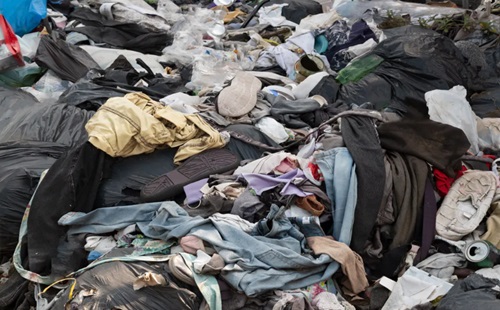An influential environmental organization, Greenpeace Africa urges Ghana to ban import of ‘broni wawu’ , has urged the Ghanaian government to prohibit the importation of second-hand clothing, often known as “foss,” “broni wawu,” or “bend down boutique,” along with textile waste from the global north, highlighting the significant environmental and health dangers associated with these imports.
During the unveiling of a report named “Fast Fashion, Slow Poison: The Toxic Textile Crisis in Ghana,” Hellen Kahaso Dena, Project Lead of the Pan-African Plastics Project at Greenpeace Africa emphasized the risks associated with the importation of textile waste. She pointed out that such waste frequently harbors hazardous chemicals capable of polluting soil and water, disrupting ecosystems, and posing threats to public health.
“Ghana is drowning in fast fashion waste,” Madam Dena said at the event organised by Greenpeace Africa in Accra. She called on the government to act swiftly by prohibiting the import of unusable clothing and encouraging the growth of sustainable local textile industries.
Dena asserts that a significant portion of imported clothing labeled as “used” is actually non-functional waste, miscategorized to circumvent regulations governing waste exports.
Read Also: Passengers stranded after strike at main Kenya airport
She criticized the practice, highlighting that Africa has turned into a receptacle for Europe’s discarded textiles, resulting in severe consequences for both the environment and public health.
“We want the government to enact laws ensuring only resellable and usable clothing is imported,” she said.
She urged the adoption of the ‘Polluter Pays Principle,’ emphasizing the need for the Global North to acknowledge and address the harm inflicted by the international trade in used clothing.
Mr. Sam Quashie-Idun, the Head of Investigations at Greenpeace Africa, presented concerning statistics regarding the second-hand clothing trade. He disclosed that Accra’s Kantamanto Market receives 7.5 million articles of used clothing weekly, noting that approximately half of these items are of inferior quality and constructed from synthetic materials. According to stallholders, as much as 60% of these items are deemed unsellable, frequently finding their way to informal dumps or being incinerated, which results in the release of hazardous chemicals.
Mr. Quashie-Idun expressed grave concerns, stating, “Our people, our rivers, and our beaches are choking,” while emphasizing the pressing necessity for measures to combat what he termed “waste colonialism,” a framework that undermines both African lives and the environment.
An advocacy group is urging the establishment of international legislation, akin to current dialogues surrounding plastic pollution, to address the global challenge of textile waste.























